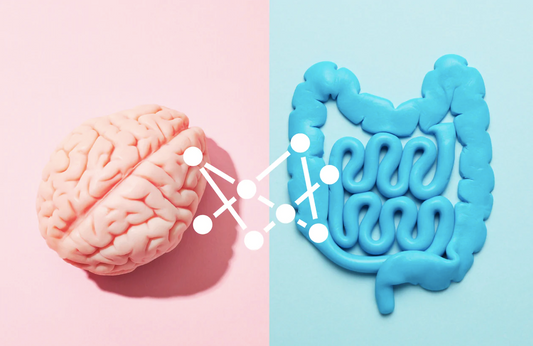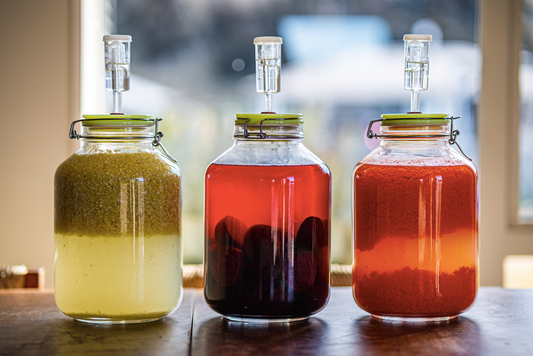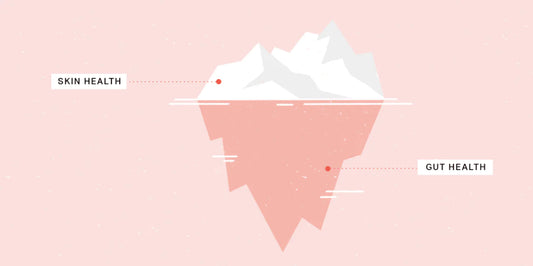If you find yourself salivating over something sweet as 3.30itis rears its familiar head, you are most definitely not alone - and as it turns out - not to blame either. As misconceptions surrounding food cravings continue to be debunked, what used to be championed as an issue of ‘self-control’ has proven to be much more complex.
While genetics and hormones are partially responsible for our sugar cravings, science is beginning to unearth the evidence to show the role our gut microbes play in influencing our brain and subsequently our food & sugar cravings.
Let’s delve into how exactly our gut microbes do this and how we can look at taking back control of our cravings.
It all begins with the gut-brain axis.
There is a two-way communication pathway between the gut and brain via the vagus nerve, which is more commonly known as the gut-brain axis.
Many of us will be aware of the connection between our brain and gut - which is often referred to as our “second brain”. The relationship between the two starts with what food we eat, as this determines the balance of microbes in our gut.
How does this affect our food and sugar cravings?
As these populations of bacteria change, they release different chemicals into our body and activate areas within our microbes to send commands to the rest of the body, including the brain, via the vagus nerve.
This is how our microbes have control over our mood - and subsequently our cravings.
Manipulation by our microbes

There are two key ways that our gut microbes send messages to the brain to control our mood and influence what cravings we have - both the good and the bad.
- Our microbes can produce toxins that make us feel miserable if they don’t get the sustenance they want. These toxins not only affect our mental & physical well-being but also send signals to the brain to make us think we NEED food, in order to survive.
- Microbes can increase our craving for a food they like by literally changing our taste buds and producing neurotransmitters such as dopamine and serotonin to make us happy when consumed (this goes for beneficial AND harmful bacteria).
The bottom line is that our pesky wee gut microbes are manipulating us.
The vicious cycle of sugar cravings
Our microbes have their own unique preferences. Although many can live off a range of substances and nutrients, they usually prefer one over another. For instance, some bacteria prefer sugar over fat. Others will only grow if there is a specific nutrient in our diet.
Let’s say you have a bacteria that loves sugar - which is very common, especially in people that have gut imbalances such as leaky gut. By consuming large quantities of sugar, you are feeding the bacteria, helping it thrive.
The more the bacteria thrive, the more these pesky microbes make you crave sugar, so they can continue growing rapidly until they are dominant.
It’s an ongoing vicious cycle - and highlights why changing our eating habits can be difficult as these bacteria create cravings for their own unique nutrient preferences - so they can survive against other gut bacteria.
An increase in sugar cravings and/or appetite also serves as a warning sign that your gut is out of balance.
Healthy gut, control thy cravings

Now that you know just how intelligent and manipulative your gut microbes are, begs the question - what can you do to reign in your appetite & cravings?
First of all - you’ve already taken one incredibly important step by actively increasing your knowledge!
Understanding what is causing your cravings and what your body is trying to tell you, can make them much easier to overcome - especially when you can be confident this isn’t a willpower issue!
From here, it’s about embarking on a mission to heal your gut. That way, you can repopulate the gut with beneficial bacteria and balance out the sugar-obsessed ones. Healing your gut isn’t an easy process.
If you are suffering from something such as leaky gut (you can read more about this in our article about Psoraisis) we recommend seeing a professional before embarking on any major dietary changes.
However, there are some simple changes you can make that will boost your gut:

- Increase the number of whole foods in your diet. You may find cravings reducing significantly after you adopt a more nutrient-dense diet over a few months. Nutrient-dense means a wide variety of foods - leafy green vegetables, fibre-rich foods, complex carbohydrates and healthy fats.
- Reduce inflammatory foods: For this, you can take a common-sense approach by quite literally reducing what you crave - refined sugars, alcohol, processed foods and saturated fats.
- Prebiotics AND probiotics: Many of us take probiotics but prebiotics are great as they primarily feed beneficial bacteria. They have also been shown to alter emotional processing, induce satiety hormones, and increase the population of beneficial bacteria. Prebiotics also acts as a primer, so that you can get the most out of probiotics.
-
Include fermented foods and beverages in your diet: Fermented foods and tonics - like our own Kvass ones, are like superheroes when it comes to gut health. They really show their potential when it comes to reducing sugar cravings - as they literally eat some of the sugar for you.
This is because fermentation usually involves the conversion of sugars to acids. For example, the lactose in milk is converted to lactic acid to make milk kefir. So if you eat fermented foods or drinks, they will consume excess sugar from other foods or drinks you’ve had and reduce the negative effects of the sugar.
If you are wanting to learn more about the different types of fermented foods, check out last month's blog “Kombucha, Kefir, Kvass, Kimchi… are you confused with a capital "K"?”, where we look at all these in-depth and put them head-to-head to see which is best for your health.




